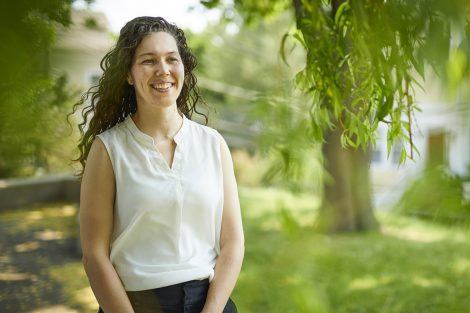May 26, 2021—Hannah Cory wants to fix the broken systems that perpetuate weight stigma and allow kids to grow up feeling as if something is wrong with their bodies. In a recent interview, she described how her work as a school dietitian in southeastern Michigan inspired her thesis work at Harvard T.H. Chan School of Public Health, and the Hulu binge that’s been helping her get through her final days as a student.
I’m from a town called Eureka, California. It’s in a very isolated part of the state—where most of the redwood trees are—about five hours north of San Francisco. I had a pretty rural upbringing in a lot of ways, surrounded by cowboys and hippies. It’s beautiful, but growing up there definitely came with some challenges. You’re limited in what you have access to, so you have to figure out ways to have fun. I wound up doing a lot of volunteer work to have something to do. My friends and I once dressed up as cow mascots for a fun run event at a nearby town. It was either do something like that on a Saturday or just drive around.
I’ve always loved food, and I grew up in a family where all the women are great cooks. As an undergrad at Stanford, I majored in human biology with a concentration in food policy. During undergrad, I interned with the School Nutrition Association in Washington, D.C., right around the time that Michelle Obama was starting the Let’s Move campaign. When I saw dietitians speaking at meetings on the Hill, my interest was sparked. I wanted to have the training that they had backing up my work.
I became a dietitian at school-based clinics in Ypsilanti, Michigan. It was like having a real doctor’s office, but next to the band room. It seemed like a really exciting opportunity, because it was accessible to everyone, and free, and I would be able to follow up with the kids I was seeing. But while I had some incredibly motivated patients, I didn’t see my work making a difference. A lot of these kids were really struggling because of the messages they received about their weight and their health. I realized that there was a bigger problem. As I’ve been reflecting on this work during my PhD training, I’ve realized that the thing that was hurting these kids more than almost anything was people telling them that there was something wrong with their bodies.
At Harvard Chan School, I was fortunate to take a few classes with Nancy Krieger, professor of social epidemiology. She taught me how to look at the theories and assumptions behind what we do in public health, and to name and investigate premises that didn’t sit well with me. It’s helped me become a much better researcher and clinician.
My work looks at new ways to measure weight stigma. Rather than just analyzing instances of teasing and bullying, I wanted to find a more expansive approach. My thesis explored how often young people hear comments about their weight, how Latinx young people, specifically, internalize the ideal that thin is best—and how these experiences raise the risk for disordered eating. Black and brown people have largely been excluded from weight stigma and eating disorder research, because there are a lot of assumptions that this is a problem for young, white girls. My work indicates that the issues these populations face are different than those faced by white populations, but they are not absent.
I would love to see a more expansive definition of health, without emphasis on weight. We don’t have to punish our bodies. Doing things that feel good and are good for you don’t have to be mutually exclusive. I would also love to see less of a moralistic approach to food. I think the idea of “good” vs “bad” food, or “clean” vs “unclean” food is really dangerous.
I’ve been bingeing the sitcom Superstore on Hulu. As someone who is very interested in creating a world without fatphobia, consuming media can be really hard because weight is just such a common joke. This show isn’t perfect, but there’s a lot of body diversity. People of all shapes and sizes are considered beautiful, find joy, and have love stories. I appreciate that in my content these days.
My goal has always been to do good work that is meaningful to actual people’s lives. I don’t know whether that means I will wind up in academia. The work will take whatever form it takes.
Photo: Kent Dayton
